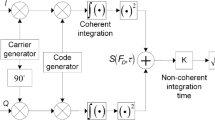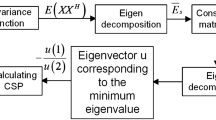Abstract
Signal acquisition is the prerequisite for the receiver’s work. The current optimization of the signal acquisition algorithm is mainly focused on the improvement of the acquisition performance, and the optimization of the signal acquisition calculation amount is relatively ignored. Aiming at the computational optimization problem of the navigation signal acquisition algorithm, this paper establishes the equivalent detection capability factor under the unit computational complexity, determines the optimal search interval, and establishes the computational model of the acquisition process. The three common signal acquisition search algorithms are analyzed in detail, and the joint optimization of signal acquisition performance and computational complexity is established. In this paper, a joint optimization function of signal acquisition performance and computational complexity is established, the optimal pre-detection integration time is determined, and the acquisition algorithm is optimized. For the parallel acquisition algorithm in the frequency domain, the acquisition performance can be optimized by only about 1.87 dB, and nearly 60% of the acquisition calculation amount can be optimized, sacrificing part of the acquisition performance in exchange for a smaller computational complexity. The acquisition algorithm optimization method in this paper can alleviate the shortage of computing resources caused by the rapid increase in the number of signals during the development of low-orbit systems, and can also be applied to low-power receivers to reduce the resources consumed by acquisition.
Access this chapter
Tax calculation will be finalised at checkout
Purchases are for personal use only
Similar content being viewed by others
References
Zu, B.: Research on the Key Techniques of Compass-M1 Civilian Software Receiver. Harbin Engineering University
Eschenbach, R.F.: GPS receiver having improved signal acquisition at a low signal to noise ratio. US (2004)
Zhangwei, D., Zhang, S.: LEO-assisted High-sensitivity and fast acquisition algorithm of Beidou B1C signal. Navigat. Position Timing 8(5), 23–31 (2021)
Cui, S.: Research on Synchronization Technology of High Dynamic Communication Link of LEO Satellite. Beijing Institute of Technology, Beijing (2015)
Li, D., Li, S., Li, J., et al.: Summary of research on signal acquisition methods of global navigation satellite system. Comput. Eng. Design 37(1), 7 (2016)
Borio, D., Camoriano, L., Presti, L.L.: Impact of GPS acquisition strategy on decision probabilities. IEEE Trans. Aerosp. Electron. Syst. 44(3), 996–1011 (2008)
Zhang, H.: Design of high sensitivity GPS acquisition algorithm with optimized calculation. Southeast University (2018)
Liu, Y.: Research on High-precision Modeling and Receiving Technology of Modern Navigation Signals. National University of Defense Technology (2014)
Qi, X.: Research and Verification of Beidou Satellite Navigation Receiver Acquisition and Tracking Technology. Southeast University (2020)
Liu, X., Yin, C., Yu, Q., et al.: Implementation of PMF and FFT acquisition design for B1C signal based on ASPeCT. J. Phys. Conf. Ser. 1952(4), 042135 (2021)
Xie, G.: GPS principle and receiver design (2009)
Feng, R., Ma, H., Ren, Y.: An improved method of BDS B1C signal acquisition. J. Navigat. Position. 7(3), 7 (2019)
Wang, F.: All-Digital Fast Acquisition of Direct Sequence Spread Spectrum Signals. National University of Defense Technology (1998)
Wan, G.T.: A method for acquiring satellite navigation signals with high dynamics and low signal-to-noise ratio. Navigat. Position. Timing 6(04), 64–70 (2019)
Cheng, L., Dai, Y., Guo, W., Zheng, J.: Structure and performance analysis of signal acquisition and Doppler tracking in LEO augmented GNSS receiver. Sensors 21(2), 525 (2021)
Author information
Authors and Affiliations
Corresponding author
Editor information
Editors and Affiliations
Rights and permissions
Copyright information
© 2022 Aerospace Information Research Institute
About this paper
Cite this paper
Zhang, P., Huang, X., Li, J., Liu, Z., Ou, G. (2022). Acquisition Algorithm Optimization Based on Amount of Computation and Performance Joint. In: Yang, C., Xie, J. (eds) China Satellite Navigation Conference (CSNC 2022) Proceedings. CSNC 2022. Lecture Notes in Electrical Engineering, vol 909. Springer, Singapore. https://doi.org/10.1007/978-981-19-2580-1_54
Download citation
DOI: https://doi.org/10.1007/978-981-19-2580-1_54
Published:
Publisher Name: Springer, Singapore
Print ISBN: 978-981-19-2579-5
Online ISBN: 978-981-19-2580-1
eBook Packages: EngineeringEngineering (R0)




